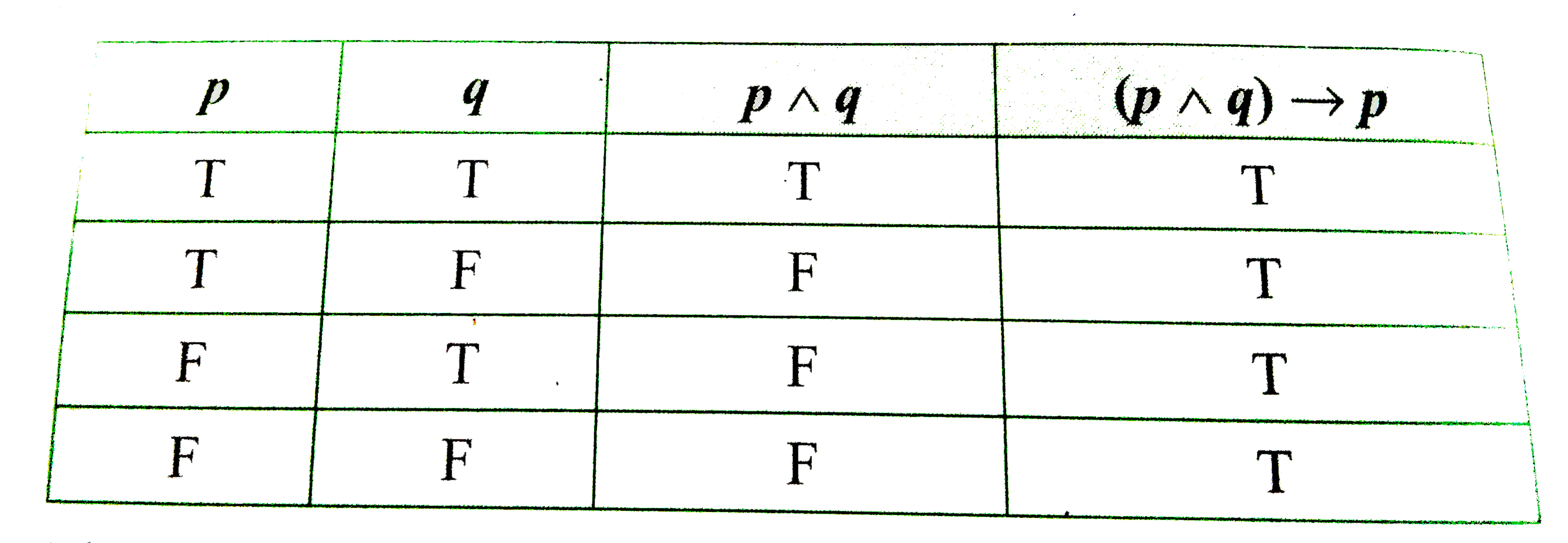The conditional statement (p∧q)→p is Solution in Bengali
a tautology
a fallacy
neither tautology nor fallacy
None of these
The correct Answer is:A

Therefore, (p∧q)→p is tautology
Topper's Solved these Questions
- MATHMETICAL REASONINGBOOK - CENGAGE PUBLICATIONCHAPTER - MATHMETICAL REASONINGEXERCISE - Archives
10 Videos
- MATHMETICAL REASONINGBOOK - CENGAGE PUBLICATIONCHAPTER - MATHMETICAL REASONINGEXERCISE - concept application
13 Videos
- LOGARITHM AND ITS PROPERTIESBOOK - CENGAGE PUBLICATIONCHAPTER - LOGARITHM AND ITS PROPERTIESEXERCISE - JEE ADVANCED
1 Videos
- MATRICESBOOK - CENGAGE PUBLICATIONCHAPTER - MATRICESEXERCISE - All Questions
509 Videos
Similar Questions
Statements -1 : ~(p↔~q) is equivalent to p↔q
Statement-2: ~(p↔~q) is a tautology.
View SolutionWrite down the truth table for the compound statements :
(~p∨q)∧(~p∧~q)
View SolutionLet (x0,y0) be the solution of the following equations: (2x)1n2=(3y)1n3 31nx=21ny The x0 is 16 (b) 13 (c) 12 (d) 6
View SolutionIn which of the following type of matrix inverse does not exist always? a. idempotent b. orthogonal c. involuntary d. none of these
View SolutionThe conditional statement (p∧q)→p is
View SolutionThe statement (p→q)→[(~p→q)→q] is
View SolutionStatement-1 : (p∧~q)∧(~p∧q) is a fallacy.
Statement -2: (p→q)↔(~q→~p) is a tautology .
View SolutionContrapositive of the conditional statement
(~p)→(p∧q) is
View SolutionTwo component statement p and q of the conditional statement "p and q " denoted by -
View SolutionTwo component statement p and q of the conditional statement "p if and only if q " denoted by -
View SolutionThe statement (p → q) ∨ (q → p) is
View SolutionIf p and q be two statement, then the conditional statement p→q is false, when :
View Solution(p/\~q)\/q\/(~p/\q)উক্তিটির সমতুল্য উক্তি হল—
View SolutionThe conditional statement (p∧q)→p is
View Solution……………of the following is converse of the contrapositive statement of the conditional statement p⇒~q
View SolutionThe conditional statement (p∧q)→p is
View Solution
